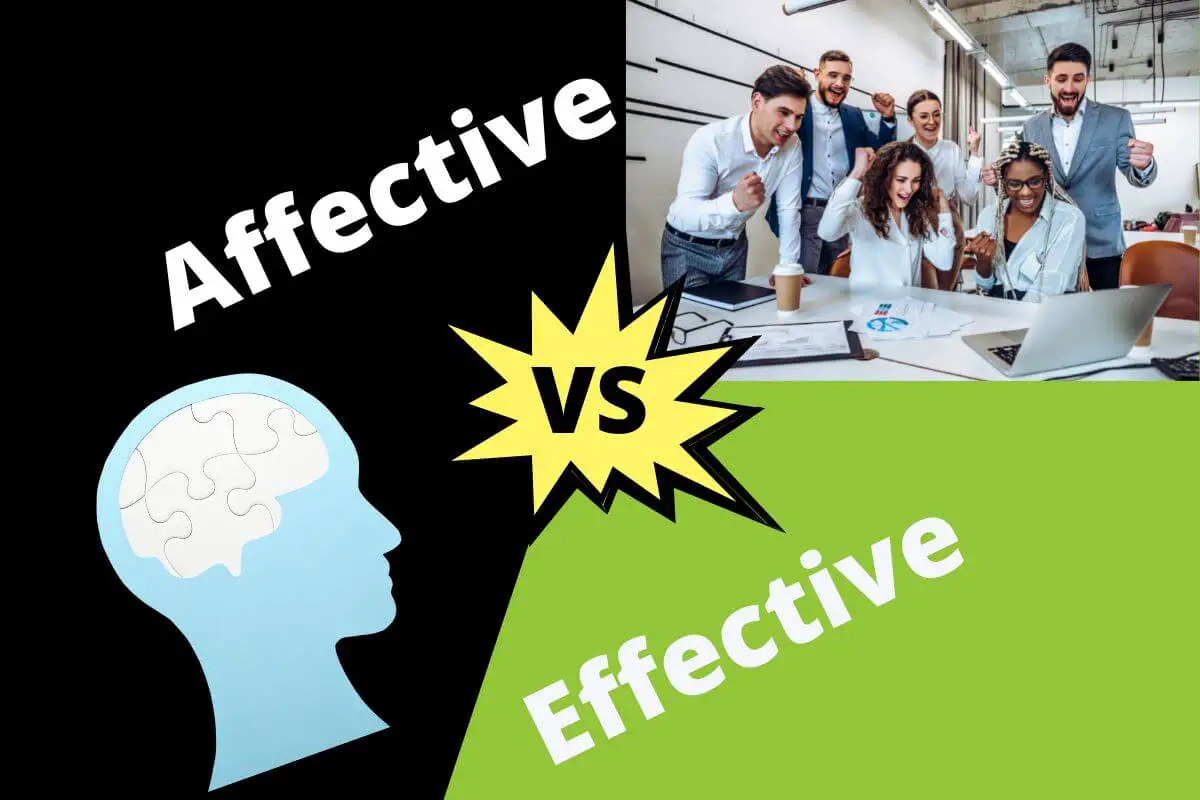The main difference between affective and effective is that an affective action is motivated by feelings, while an effective action yields the desired results.
Despite having almost identical sounds and spellings, affective and effective have different meanings and represent two unique ideas in the English language.

Table of Contents
Affective vs Effective
| Affective | vs | Effective |
| Affective means items either result from or are impacted by emotions or feelings or have some other connection. | Meaning | Effective refers to anything producing intended results. Something is effective specifically when it yields the desired outcomes. |
| The verb affect serves as the origin of affective. | Root | The word effective originates from the word effect. |
| Example sentence: Doctors say that some of their patients seem to have a summertime variant of seasonal affective disorder. | Usage | Example sentence: Antibiotics are effective in treating throat infections. |
Difference Between Affective And Effective
Meaning
An affective action is motivated by feelings. As such, affective items either result from or are impacted by emotions or feelings or have some other connection. Affective may also mean that something conveys feelings.
The adjective affective, derived from the word affect, is widely used in writing about psychology. When someone displaying a powerful emotion, every aspect of that emotional state you can see is an affect.
The word effective means anything producing desired results. Something is effective specifically when it yields the desired outcomes.
To remember affective and effective, this reverse mnemonic device may be helpful: a stands for emotion and e for action.
Root
Affect, which means, “to influence or to behave in a certain manner,” is the verbal form of the adjective affective. To affect anything is to have an impact on or change someone’s mental state such that they feel or behave in a specific manner.
Being capable of persuading another person or a group of individuals to feel, think, or behave in the way you would like them to indicates that you are an affective person. Being affective is one of the most crucial qualities that salespeople and marketers should have.
The word effective originates from the word effect. You may employ the term effect as both a noun and a verb. The definition of effect as a noun is often “the outcome of anything.” Something else should take place before the desired effect could occur.
Usage
If you are reading a study from the field of psychology, you may run across the word affective. For instance, you may learn about affective illnesses, which deal with emotions and include conditions like depression or bipolar disorder.
You may use this affective to express anything that makes you feel strongly or deeply. For instance, you might describe an opera as being particularly affective if the tale is moving.
You may use effective in many different circumstances. A specific teaching strategy that has improved pupils’ academic performance by 10% would be considered effective.
An effective illustration would be that new legislation takes effect instantly, which means it does so quickly and without delays.

Can Affect Refer to a Noun And Verb?
An emotional reaction expressed or seen is the noun affect. For instance, someone shocked may seem to have no emotion and have a blank look. Both the noun affect and the adjective affective are related to feelings, thoughts, and mood.
When to Use Affective and Effective
It can be difficult to remember the distinction between affective and effective. Although they have almost similar spellings, everything becomes instantly evident if you consider what they stand for.
It can be helpful to associate effective with efficient in your mind since they have similar definitions and similar spelling. In comparison, affective has the same root as affection, which denotes feelings and emotions.
Therefore, remembering the word’s origin will aid in understanding its meaning. Before utilizing the words effective or affective, consider these tips so that you may use them correctly and convey the intended sense.
If you found this article helpful, be sure to check out this article on the difference between love and in love.

